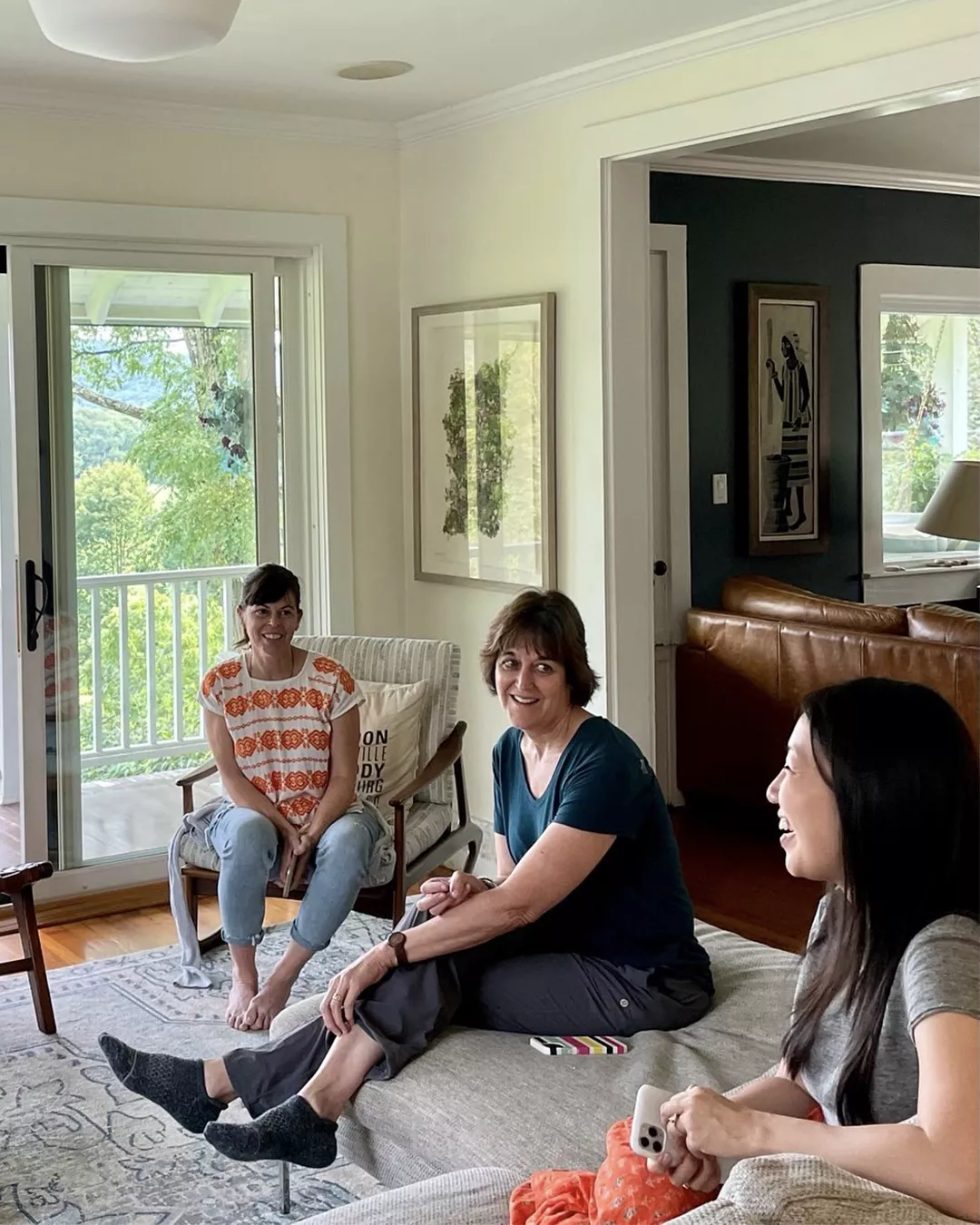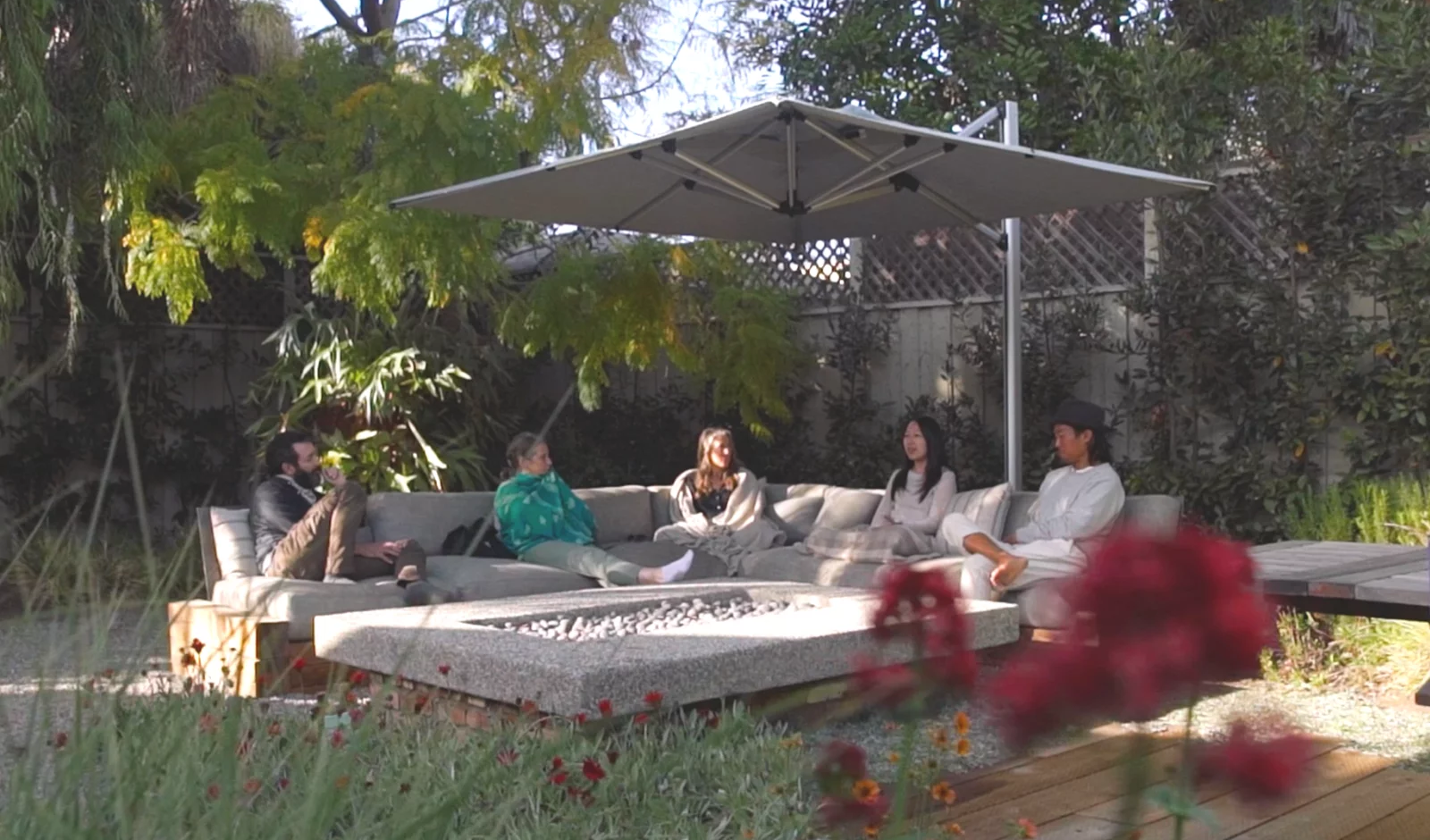What Happens in Group Meditation?
Hosting Group Meditation events is one of the best parts of my work as a Vedic Meditation teacher.
Something special happens when meditators come together to practice. When we meditate as a group, the wholeness of experience is far greater than the sum of the parts.
Our collective consciousness uplifts each attendee, and meditators walk away from the group meditation experience feeling inspired and ever-more committed to their meditation practice.
I’ve written previously about the benefits of group meditation; I’d like to share more about what happens during group meditation and what you can expect from a group meditation session.

Group Meditation: Your Weekly Check-In With Your Teacher
Group Meditations take place online each week, and many meditators think of our weekly Vedic Meditation online group sessions like “office hours” with their teacher.
A meditation practice will evolve as one continues with the practice. Different experiences happen inside meditation, and as stress is released regularly inside Vedic Meditation, the experience of life outside meditation also begins to evolve and improve.
Weekly group meditation events are a wonderful way to regularly check in to share experiences and get any questions answered that may have been coming up for you.
Part 1: Technique and Practice Q&A
I open each group meditation by answering technical questions about Vedic Meditation.
Some common areas of discussion that we dive into are:
- How to fit Vedic Meditation into our busy, high-demand lives
- Thought-filled meditations and what this means for your meditation practice
- The use of the mantra inside meditation (how often to think it, why we forget to think it, etc.)
- How to be easy with meditation and set accurate expectations for the practice
- Going deep inside meditation vs. feeling shallow
- Benefits of twice-daily meditation
Answering these questions is a wonderful way to kick off a group meditation, as it reinforces the fundamentals of the practice before we dive into group meditation together.

Start your Meditation Journey Today
ATTEND A FREE INTRO TALK
Part 2: Meditate Together as a Group
We then close our eyes and enjoy a 20-minute Vedic Meditation practice.
While the practice in a group setting doesn’t change, many meditators report that the experiences inside a group meditation can feel more profound compared to meditating on their own.
Drawing upon a sophisticated concept known as Unified Field Theory, we can think of the group meditation experience as having a non-linear, compounding effect compared to meditation alone. Each additional meditator that joins a group meditation has the effect of pulling the group of meditators deeper into the stillness and silent experience of our least-excited state of awareness.
If you’ve taken a 4-Day Vedic Meditation Course with me or another qualified teacher, you’ll know that a deeper meditation experience should not be valued more highly compared to a shallow meditation.
However, it is still nice to dive deeply inside a group meditation and feel the strength in collective stillness group meditations provide.
Part 3: Vedic Wisdom – Upgrading Your Understanding of Life
After meditating, we spend the rest of our group meditation time diving into Vedic wisdom and its practical application in our lives.
If we think about the meditation practice as upgrading the hardware of our mind and body through the release of stress, growing our knowledge base through participating in Vedic knowledge is like upgrading the software of our understanding of life.
If you’ve gone through the process of purchasing a new computer or giving your current computer a refresh, you’ll know that running the latest version of an operating system on a very old computer isn’t a fun or effective experience.
While the new software comes with an updated suite of bells and whistles, the old hardware is simply not up to date enough to run it. The software may even crash often and lose its ability to execute any tasks.
In this scenario, we can think of the software as listening to podcasts and reading books on happiness and spirituality as the sole means of gaining more inner fulfillment. While the words on the page may sound wonderful in theory, in action it’s hard to live out as our body is still filled with decades of accumulated stresses that prevent us from living the words we read.
Our consciousness state isn’t yet ready to handle an improved intellectual understanding of life. And as a result, this approach can make many people feel frustrated about pursuing a more calm and centered life.
Similarly, if one’s computer hardware is fully updated to the newest model but still running an old operating system, the computer is also not being used to its fullest potential. In fact, the hardware system may not know how to interact with outdated software, which can also cause frustration.
When we practice Vedic Meditation regularly, we are committing to upgrading the hardware of our nervous system every day. This action starts to liberate us from the stresses we feel and that accumulation of stress memories that have held us back for much of our lives.
However, when we layer on the software upgrade by learning more about Vedic Wisdom and how to put it into practice, we begin to accelerate our speed of progress and evolution to higher and higher levels.
Joining weekly group meditation is a wonderful first step in gaining traction with Vedic knowledge and concepts around making the most of your Vedic Meditation practice.
Vedic Wisdom Topics
Here is a sampling of topics of Vedic wisdom that we dive into each week:
- Trust and truth
- How to develop accurate expectations
- How to meet others where they are
- Letting go and the art of surrender
- The power of speech and the art of speaking
- States of Consciousness
- What Enlightenment really means
- Vedic worldview on current news and developments
Many times, we’ll vote at the end of each session for the topic for the following week. It’s a collaborative effort that we enjoy as a community.
We end each Vedic group meditation with an open Q&A for meditators to digest and integrate the Vedic wisdom topic for the week.

The Strength of a Vedic Meditation Bond
Unlike other mindfulness group events I’ve previously attended, one of the contrasting experiences of a Vedic Meditation group event is how strongly bonded the community of meditators is.
This was actually one of the key features of Vedic Meditation that struck me when I first turned away from mindfulness practice to Vedic Meditation. The calm and lightheartedness of the group was the foundation from which group meditation unfolded.
And it’s not so much that the mindfulness group discussion topics and structures were much different compared to Vedic Meditation group meditations.
The difference is in the strength of the practice underlying the discussion itself. Vedic Meditation has a key feature of allowing the mind to regularly and reliably step beyond the thinking realm into a layer of unbounded, deep stillness and calm. Meditators do not practice a variety of meditation techniques; they stick with one practice that gets strengthened and reinforced twice daily.
As a meditator, it’s wonderful to share this experience with others who also enjoy transcendence. The fullness of the experience of transcendence is unlike any other meditation experience, and sharing these experiences feels special.

Independent Practice + Group Meditation = 200% Value of Meditation
I’m pretty much a broken record when it comes to touting the benefits of twice-daily Vedic Meditation practice.
A primary benefit of developing consistent meditation habits is the ability for us to get ahead of stress and release more stress than we can take on in any given day.
And for us to develop the regularity of practice, it’s important that we begin thinking about meditation as an exclusively social or group-centered event as a personal inward practice that we enjoy on our own self-sufficiently.
When we begin to go without the need for an instructor or a group of friends around to complete the work of releasing stress and experiencing bliss and stillness from within.
Still, despite the importance of cultivating independence with one’s practice, I also strongly recommend every meditator supplement their daily solo meditation practice with regular attendance at group meditation.
It’s not only a fun way to make new friends and build camaraderie with like-minded individuals, but you’ll give yourself the gift of taking your meditation practice to the next level.
Take the Next Step: Join Me for a Group Meditation
Group Meditations are free community events that take place each week. These meditation sessions are open to any meditator who has completed an in-person 4-Day Vedic Meditation or Transcendental Meditation course.
They take place every week, and you can find the schedule here.
If you have not learned Vedic Meditation and are interested in joining a community for group meditation, I invite you to learn more about our Vedic Meditation community by first joining me for a free, no-obligation Introductory Talk.
You can find my Intro Talk schedule here.
I look forward to supporting you on your meditation journey!
Love,
Susan






